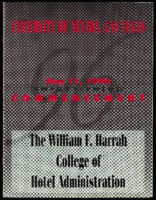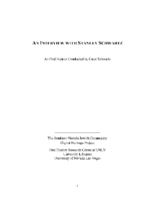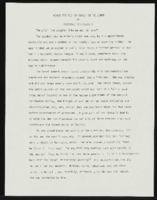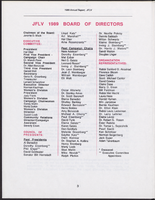Search the Special Collections and Archives Portal
Search Results

Aracely Rascon oral history interview: transcript
Date
Archival Collection
Description
Oral history interview with Aracely Rascon conducted by Claytee D. White on October 2, 2018 for the Remembering 1 October Oral History Project. In this interview, Rascon recalls her early childhood in Chihuahua, Mexico and until her father brought the family to Las Vegas, Nevada. She studied interior design at the University of Nevada, Las Vegas (UNLV) and joined the firm of Simpson Coulter, where she specializes in decorating the interiors of businesses and schools. Two weeks after the October 1, 2017 shooting, her skills were called upon by those across the city who were preparing the Resiliency Center for survivors of the mass shooting. This proposed Resiliency Center needed carpet, paint, furniture, art work, and everything else to make it into a place where people could seek assistance in a peaceful atmosphere where they could tell their stories and ask for help. Rascon contacted all her resources and was pleasantly surprised when each company bent over backwards to offer deals, advice, and referrals. Rascon learned that she could use her talents and decorating skills to help others be at peace and to dialogue and perform in comfort. She will never forget and will be forever grateful to the sense of community displayed by her city.
Text

Dani McLaughlin oral history interview: transcript
Date
Archival Collection
Description
Oral history interview with Dani McLaughlin conducted by Barbara Tabach on February 14, 2018 for the Remembering 1 October Oral History Project. In this interview, Dani McLaughlin discusses the October 1, 2017 mass shooting in Las Vegas, Nevada and how she tried to find safety with her husband and a group of friends, one of whom was shot. She talks about finding refuge in her office at Atlantic Aviation. McLaughlin mentions the different ways her life and the lives of her family members have been affected, including how her children reacted to the shooting.
Text

University of Nevada, Las Vegas (UNLV) William F. Harrah College of Hotel Administration 33rd commencement program
Date
Archival Collection
Description
Commencement program from University of Nevada, Las Vegas Commencement Programs and Graduation Lists (UA-00115).
Text

Transcript of interview with Stanley Schwartz by Carol Schwartz, March 1, 1980
Date
Archival Collection
Description
Interview with Stanley Schwartz by Carol Schwartz on March 1, 1980. Stanley talks about coming to Las Vegas in 1951 to open a clothing business on Main Street, Schwartz Brothers Clothing. He compares the business district of the 1950s to the district in 1980, and advertising opportunities in the newspapers and on the radio. Schwartz talks about suit styles and changing preferences of buyers, and moving the store to Second Street, then Fremont Street, then to Maryland Square Shopping Center. In 1970, he changed the focus of the clothing store to "big and tall" and talks about the importance of customer service in retaining customers. He mentions Al Benedict and Herb Tobman as people he admired.
Text

"Never Too Old To Forget Or To Learn": short story by Roosevelt Fitzgerald
Date
Archival Collection
Description
From the Roosevelt Fitzgerald Professional Papers (MS-01082) -- Short stories and poems by Roosevelt Fitzgerald file.
Text

Luis F. Valera interview, January 23, 2019: transcript
Date
Archival Collection
Description
Interviewed by Nathalie Martinez. Laurents Bañuelos-Benitez also participates in the questioning. Luis F. Valera serves as the Vice President of Government Affairs at UNLV. His heritage is from Venezuela and Cuba. He has served as the Chairman of the Latin Chamber of Commerce and has been an active member of the Latino community since his pursuing his undergraduate degree at UNLV in Political Science and his Juris Doctorate degree from the William S. Boyd School of Law. His various achievements in the community and nation led him to become recognized and awarded the Arturo Cambeiro Hispanic of the Year Award in 2011.
Text

Antioco Carrillo interview, 2019: transcript
Date
Archival Collection
Description
Interviewed by Monserrath Hernández, Rodrigo Vazquez, and Laurents Benitez-Bañuelos. A native of Jalisco, Mexico, moved to Las Vegas when he was about 20-year old in 1987. Attended CSN and UNLV. His history with Las Vegas is embedded in the 1980s Las Vegas gay scene and education for AIDS. He is and activist and the Executive Director of Aid for AIDS of Nevada. He and Theodore Small are the first same-sex marriage in Nevada.
Text



